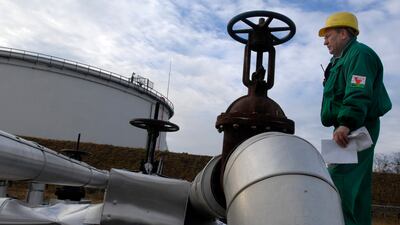Russian oil supply through Ukraine to parts of Europe has been stopped since August 4, as western sanctions halted the payment of transit fees, Russian pipeline operator Transneft said on Tuesday.
The Moscow-based company said its payment for August oil transit through the southern Druzhba pipeline was made to Ukraine's pipeline operator Ukrtransnafta on July 22, but the money was returned on July 28.
Russian lender Gazprombank, which handled the payment, said the money was returned because of EU restrictions, Transneft said in a statement, cited by Reuters.
Gazprombank, the third largest bank in Russia by assets, is not subject to EU sanctions.
The affected European countries include Hungary, Slovakia and the Czech Republic.
Transneft said there was no effect on the northern part of the Druzhba pipeline, which runs through Belarus to Poland and Germany.
“To resolve the issue, Transneft sent an appeal to an authorised bank for further transfer of information to the European regulator in order to obtain permission to conduct settlements … options for an alternative flow of funds are being worked out, daily consultations and negotiations with servicing banks are carried out,” the pipeline operator said, as cited by Politico.
“However, to date, the issue of the possibility of making payments has not been resolved,” it said.
The reason for the returned payment was given as “the entry into force of EU Regulation 2022/1269. In particular, the procedure for controlling cross-border payments from the Russian Federation was specified”, Politico said.
Russia supplies nearly 250,000 barrels a day through the southern leg of the Druzhba pipeline, according to Reuters.
Lukoil, Rosneft and Tatneft are main suppliers of oil through the Druzhba route.
The announcement pushed up oil prices, which have slumped in recent days on concerns of a demand slowdown because of recessionary fears.
Brent, the benchmark for two thirds of the world's oil, rose to nearly $98 a barrel before dropping again. It was trading 1.12 per cent lower at $95.57 a barrel at 8.52pm UAE time on Tuesday.
Russia, the world's second-biggest exporter of crude, is a major supplier to Europe. Its natural gas supply accounts for about 40 per cent of European imports and has been a lifeline for the continent.
European governments are attempting to fill up gas reserves before the winter, amid fears that Russia could cut its supply pipelines.
Last month, Russian state-owned energy company Gazprom cut shipments on the Nordstream pipeline to Germany to 20 per cent of capacity, citing issues with turbines. The move sent gas prices to the highest levels since March, soon after Russia’s war in Ukraine began.
Last month, Russia, whose economy has been hit by western sanctions, said it will not supply oil to countries that opt to impose a price cap on its crude.
The price cap has been proposed by western countries to make it difficult for Russia to fund its war in Ukraine.

